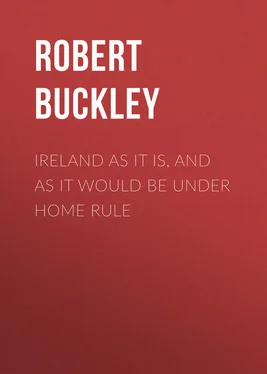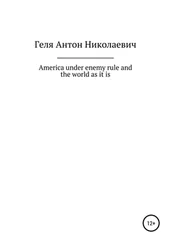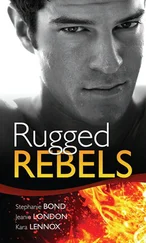Robert Buckley - Ireland as It Is, and as It Would Be Under Home Rule
Здесь есть возможность читать онлайн «Robert Buckley - Ireland as It Is, and as It Would Be Under Home Rule» — ознакомительный отрывок электронной книги совершенно бесплатно, а после прочтения отрывка купить полную версию. В некоторых случаях можно слушать аудио, скачать через торрент в формате fb2 и присутствует краткое содержание. ISBN: , Жанр: foreign_antique, foreign_prose, на английском языке. Описание произведения, (предисловие) а так же отзывы посетителей доступны на портале библиотеки ЛибКат.
- Название:Ireland as It Is, and as It Would Be Under Home Rule
- Автор:
- Жанр:
- Год:неизвестен
- ISBN:http://www.gutenberg.org/ebooks/29710
- Рейтинг книги:5 / 5. Голосов: 1
-
Избранное:Добавить в избранное
- Отзывы:
-
Ваша оценка:
- 100
- 1
- 2
- 3
- 4
- 5
Ireland as It Is, and as It Would Be Under Home Rule: краткое содержание, описание и аннотация
Предлагаем к чтению аннотацию, описание, краткое содержание или предисловие (зависит от того, что написал сам автор книги «Ireland as It Is, and as It Would Be Under Home Rule»). Если вы не нашли необходимую информацию о книге — напишите в комментариях, мы постараемся отыскать её.
Ireland as It Is, and as It Would Be Under Home Rule — читать онлайн ознакомительный отрывок
Ниже представлен текст книги, разбитый по страницам. Система сохранения места последней прочитанной страницы, позволяет с удобством читать онлайн бесплатно книгу «Ireland as It Is, and as It Would Be Under Home Rule», без необходимости каждый раз заново искать на чём Вы остановились. Поставьте закладку, и сможете в любой момент перейти на страницу, на которой закончили чтение.
Интервал:
Закладка:
But my friend's conversation reminded me of something more, and I remembered a little story I heard in Dublin respecting a daily disseminator of priest-ordered politics. It owed some rent for the premises it occupies on the thymy banks of the odorous Liffey. It owed, I say, for owing, not paying, is the strong suit of the party it represents. It was pressed to pay, coaxed to plank down, soothered to shell out. A registered letter with premonitory twist of the screw "fetched" the patriot laggards. They or "It" paid up, but failed to look pleasant. In his hurry the glad recipient of the cash gave a receipt up to date instead of up to the time the rent was due. The immaculate organ of highly-rectified morality wished to hold the writer of the receipt to his pen-slip, to nobble the rent; and being reproached backed out with: —
"We thought you wanted to give it as a present." The landlord is a strong Unionist. The rottenness of repudiation is spreading everywhere. Lying and theft, under other names, would be, the dominant influences under the new régime . But it may be objected – If Irishmen have no respect for their members, why did they elect them? If they object to Home Rule, why did they vote for it? And so on, and so on. These queries at first blush seem unanswerable, but they are not really so. Attentive readers of later letters will discover the reason why. Further, it may be remarked, in passing, that questions are more easily asked than answered. Here is an instance. The facts are undeniable, staring us in the face: —
The base and bloody Balfour, unaccompanied by men who have been called his black and brutal bloodhounds, moves about in Ireland unmolested, with no other protection than that of his sister.
The bright and brilliant O'Brien, the purist-patriot, visiting the constituency of which he is the senior member, is with difficulty protected by a powerful force of the police he has so often affected to despise.
Other Nationalist members dare not appear in Nationalist quarters. How is this?
To return to the objections given above. Since the appearance of the bill, Irishmen have been changing their minds. Day by day they dread it more and more. They still believe that under certain conditions Home Rule would be a good thing for Ireland. But they begin to see that the required conditions do not exist. They begin to see that they have been used by such men as O'Brien and Healy, they see the incompetency which has reduced the party paper to so low an ebb, they see the misery and degradation which the Land League inflicted on the once thriving districts of Tipperary; they saw their neighbours, poor, unlettered men, dupes of unscrupulous lying eloquence, men whom it was murder to deceive – they saw these men sentenced to long terms of penal servitude, while the instigators of the crimes for which they had suffered, availing themselves of the liberal English law, broke their bail, and, travelling first-class to Paris, lived in the best hotels of that gay city on the plunder they had wiled from ignorant servant girls, being clothed in purple and fine linen, and faring sumptuously every day, while their friends the felons trod the tireless wheel and the housemaids went on with their scrubbing.
The Irish people have seen these things and many more, and, as the French say, they have reflected. A very considerable proportion of the lower classes have already changed their minds, but – they dare not own it. So the process of education is comparatively slow. A small farmer said to me, "Not an hour's walk from here, a small tinant like meself was suspicted to be a thraitor to the cause. He was a sthrivin' man, an' he had really no politics, an' only wanted to get lave to work his land, an' earn his bit an' sup.
"He had two sthrappin' daughters, as nice, dacent young girls as ye'd see in a summer's day. They were seen spakin' to a pliceman – that was all they done – an' four men came that night, four ruffians wid white masks, an' havin' secured the father, they dhragged the young girls out of bed at the dead hour, an' stripped them to the skin. Thin they cut off their hair close wid a knife, the way ye'd cut corn, an' scarified their bodies wid knives. Would ye wondher we're careful?"
I asked him whether a Protestant could in his district hope to be elected to any public position, the Board of Guardians for instance (he was a good Catholic). His answer was an unqualified No. Then he took time, and shortly proposed the following statement of the position, which I present on account of its gem-like finish: —
"I wouldn't say but they'd put on a Protestant av he paid for it by settlin' wid the priest that for certain considerations he would be contint wid a seat on the boord. An' thin he must renounce his political ideas, or promise never to mintion thim in public. But, begorra, he'd have to sell his birthright for a mess of pottage by makin' a decoy duck of himself!"
In adding this great specimen to the immortal list of memorable mixed metaphors, I feel that my visit to Ireland has not been quite in vain.
Oolagh, (Co. Tipperary), April 15th.
No. 10. – DEFYING THE LAND LEAGUE
Burn everything English except English coals." That was the first sentiment I heard in "rebel Cork," and it certainly expresses the dominant feeling of the local Nationalist party, who do not seem to have heard of the proposed Union of Hearts, or, if they have heard, they certainly have not heeded. Nor will anyone who knows for one moment assert that the Corkers entertain the idea. My hotel is a hotbed of sedition. It is the southern head-quarters of the Parnellite party. The spacious entrance hall is a favourite resort of the leading Cork Nationalists, who air their views in public with much excited gesture, having its basis in whiskey-nourished hatred of English rule. They walk to the bar, suck in the liquid bliss, and return to the spot whence they may look upon the beauteous promenaders of Patrick Street. They prefer the kaleidoscopic change of the streets to the stationary beauty of the bar, and while admitting the unfleeting quality of the fixed stars they worship the procession of the equinoxes. On Saturday last, the day O'Brien died, the Mayor of Cork, with Mayoral chain and hosts of satellites, might have been seen under the familiar portal, discussing the proposed public funeral of the lamented friend, once Mayor of the City, and described as "a gentleman who had, by his courageous and outspoken utterances, obtained the distinguished honour of imprisonment by the British Government." Particulars were not given, as the first two incarcerations occurred under Forster and Trevelyan. The third, under Balfour, was a term of fourteen days for assaulting a policeman. The Corporation discussed the patriot's merits without descending to detail. Outside, the newspaper boys were yelling "Arrest of Misther Balfour-r-r," but the Corporation were no buyers. The populace might be taken in, but official Cork know it was the "wrong 'un," and clave to its hard-earned pence.
Public opinion here is much the same as in Dublin, only hotter. Respectable people who have anything to lose are, if possible, more seriously alarmed. The lower classes are, if possible, more bitter, more implacable in their animosity to everything English. Nevertheless, the feeling against Home Rule is assuredly gaining ground, even among the most ardent Nationalists. The great meeting of last Wednesday showed what the Unionists could do, how they could crowd a great platform with the intelligence of the country, and fill a great hall with the Unionist rank and file. The Loyalists have astonished themselves. They knew not their own strength. Now they are taking fresh heart, determined to hold out to extremity. The Separatists – for the Corkers are Separatists au naturel – are somewhat disconcerted, and try to minimise the effect of the meeting by sneering and contumely; but it will not do. They affect hilarity, but their laughter is not real. Perhaps nothing shows the shallowness of men more than the tricks they think sufficient to deceive. And then the leaders are accustomed to a credulous public. The place is eminently religious. Cork is the Isle of Saints – with a port and a garrison to enhance its sanctity. At certain seasons a big trade is done in candles, on which names are written, which being blessed and burnt have powerful influence in the heavenly courts. It costs a trifle to hallow the tallow, but no matter. A friend has seen a muddy little well, which is fine for sore eyes. Offerings of old bottles and little headless images were planted around, but the favourite gift was a pin, stuck in the ground by way of fee. Jolly Mr. Whicker, of Dublin, who represents three Birmingham houses, saw Father McFadden, of Gweedore, waving his hat when in custody. A policeman insisted that this should cease, when a man in the crowd said to Mr. Whicker: —
Читать дальшеИнтервал:
Закладка:
Похожие книги на «Ireland as It Is, and as It Would Be Under Home Rule»
Представляем Вашему вниманию похожие книги на «Ireland as It Is, and as It Would Be Under Home Rule» списком для выбора. Мы отобрали схожую по названию и смыслу литературу в надежде предоставить читателям больше вариантов отыскать новые, интересные, ещё непрочитанные произведения.
Обсуждение, отзывы о книге «Ireland as It Is, and as It Would Be Under Home Rule» и просто собственные мнения читателей. Оставьте ваши комментарии, напишите, что Вы думаете о произведении, его смысле или главных героях. Укажите что конкретно понравилось, а что нет, и почему Вы так считаете.












